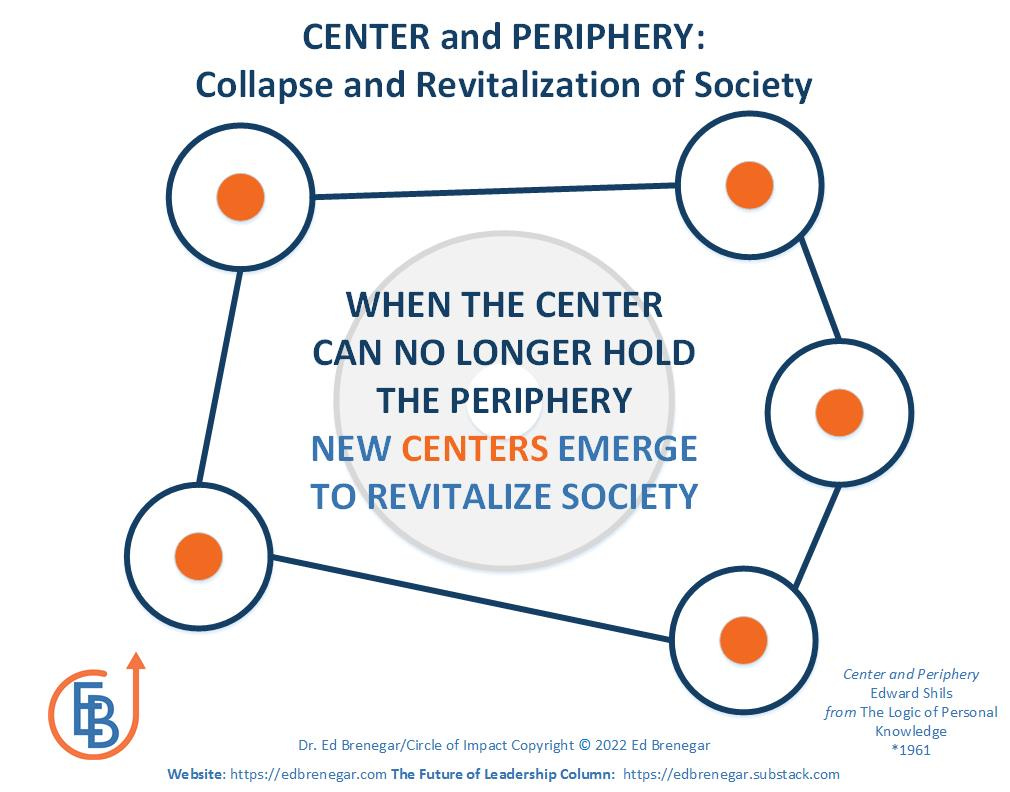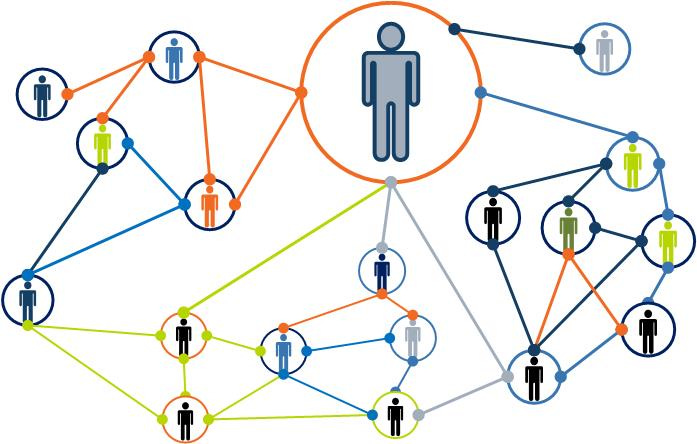Synthesizing Center and Periphery
When the Center cannot hold, the Periphery reforms
In the early 1960s, Edward Shils wrote a ground-breaking essay called Center and Periphery. In that essay, he presents a perspective of society where there is a center that is represented by the elite of society who are the caretakers of the system of beliefs that constitute the meaning of society. Shils’ thesis gives us a word image of what a homogeneous society looks like.
Sixty years later, our society is far from being homogeneous. Its heterogeneity has not produced a happy, peaceful society. But one marked by mimetic conflict between competing tribal ideologies. I am convinced that this conflict at the Center of society is intentionally provoked. It is how societal elites have learned to control a growing, culturally diverse population.
If you read Shils’ essay, the Periphery comes off as a subordinate section of society. The weight of prominence is all at the Center. Hidden and undeveloped in Shils’ notion of a Center and a Periphery in society is an understanding of the Periphery as an entity worthy of consideration in its own right. Part of the reason for this is that he is dealing with abstract notions of Center and Periphery.
I wrote about Shil’s perspective last year in a post called, As The Center Does Not Hold, The Periphery Grows. I describe what I see taking place.
In Edward Shils scenario, the Center is the controlling force of society. The progress of the Center dictates the progress of the Periphery. If the Center abandons the belief system of society in favor of more subsidiary or contrary beliefs, the Periphery will begin to abandon respect for the Center.
This fragmentation of society through its institutions is what I have observed throughout my work in the field of leadership. When the values of an organization or a society become compromised, discarded, or contrary to its historic culture, the society does not reunify, but breaks apart into smaller sub societies.
When the Center cannot hold the Periphery, it either dissolves or becomes authoritarian. It means that the Periphery is now marginalized and exists to be exploited for that which serves the interests of the Center? The integration of the Center and the Periphery is gone, and a fragmented, divided society results.
When the Center no longer supports the Periphery, the Periphery must turn to its own resources. As a result, multiple smaller Centers form. These new Centers learn to exist more independently of the traditional Center.
Who is impacted by this shift of influence away from the Center of society to the Periphery? What is the Periphery that now becomes a more prominent and calls us to awareness.
Let’s Take a Walk
Step out of your home or office. Walk down the street. Whatever you see is your world.
This is the Periphery to your Center.
It is where people live and work.
Now imagine that each person, like you, has now become their own Center.
Each business, church, school, gym, bar, laundry, hospital, car repair shop, pre-school, florist, funeral home, jewelry store, movie theatre, car dealer, art shop, and local government office is the Periphery.
When the Periphery is abandoned by the Center, you know this because the institutions that once seemed to be trustworthy are no longer. You call customer service and they can’t help you.
This means that now you are at the Center of your network of relationships. If you feel that this has come on you suddenly and that you are not prepared, that would be the understandable reaction. We have all become used to looking to leaders at the Center for direction. Now that they have abandoned us, it is on us to make sure society functions for the betterment of all.
Did you catch the implication of that last statement? You and me, and all those with whom we have respectful, trustworthy relationships are now the Center of our own networked world.
What then do we do? After all none of us were trained to be the Center of society.
Accept Three Realities
Accept that …
You are the Center of your Network.
The culture of the world you live in has changed and it does not have your best interest in mind.
Simplifying your life will make it easier to live in and adapt to an increasingly complex world.
Let’s look at each of these realities.
You are the Center of Your Network
I want you to recognize these three truths about a decentered world
You are now the Center of your own world.
You are not alone.
Your world is smaller and more managable than before.
As the Center of your world, this not about being self-centered, narcissistic, or being some guy drunk on power. Instead, it is a place of responsibility.
Your Periphery is so close that you can have a direct relationship with most of the people in it. What is true for you is also true for them. They are the Center of their own networked society.
This image captures how your relationship network exists already.
You are networked with individuals and groups of individuals. Call them friends, family, staff, vendors, or customers, clients, and patients. The society that we are directly responsible for is looking to us for guidence for how WE are going to go forward.
The simplest way to describe what I see here is captured in my book Circle of Impact: Taking Personal Initiative To Ignite Change. There I speak about leaders of impact. These are leaders not by role or title. Instead these leaders follow the philosophy that
“all leadership begins with personal initiative to create impact that makes a difference that matters.”
The people in your network are looking to you to make a difference that matters, just as you are looking to all of them to do the same. This is how we learn to be both at the Center and on the Periphery, and be both leaders and followers with one another.
Seeking a Culture of Reality
The culture of our globalized world is designed to grab your attention and never let go. It presents a serialized moment-to-moment exposure to images, sounds, and stories that affect how we understand who we are. It is designed to nullify the initiative of our human agency so that we become agents of a socio-political culture that has no respect for us. Think of it as a kind of virtual colonialism whose purpose is to extract the natural resources of our lives.
If you have spent the past ten years immersed in social media, your perception of the world has changed without your permission. I encourage you to read the essays in my Culture of Simulation series. The choice that we face is between living in a real-world of direct experience and relationship and living in the world of the Spectacle of the Real with its serialized moments of fear and divisiveness. The culture of reality is the culture that is born through our networks of relationships. To understand this reality, read through my series on Networks of Relationships. It will help you better understand how to create a culture within your life and business that elevates the leadership capacity of people.
By a culture of reality, I am referring to the daily experiences that we have where we can see a direct effect on our words and our actions. This is different than the culture of simulation where we avoid direct engagement and instead speak over the top of people to declare our expert opinion. You can see this pattern of behavior from the personalities on news commentary shows. They speak with absolute certainty and self-righteous conviction in a manner that condescends to their viewers. They are the face of the culture of simulation. As you watch them, ask this simple question, “Do they know this by direct experience or by someone telling them to say this? I have had many conversations with people who are giving me their opinion that comes from one of these shows. I ask them, “Do you know this by direct experience?”
Your direct experience is a better gauge of reality than some news readers or political appointees.
Living Simply in a World of Complexity
Living simply is simply living with self-awareness. It is being aware that the complexity of our world provides all sorts of incentives to invest time, money, and reputation in chasing positions of influence and status. In the Spectacle of the Real, I provide a quote from scientist/philosopher Blaise Pascal who wrote in the mid-17th century a description of what an unsimple life was like then.
"Sometimes, when I set to thinking about the various activities of men, the dangers and troubles which they face at Court, or in war, giving rise to so many quarrels and passions, daring and often wicked enterprises and so on, I have often said that the sole cause of man’s unhappiness is that he does not know how to be quiet in his room. A man wealthy enough for life’s needs would never leave home to go to sea or besiege some fortress if he knew how to stay at home and enjoy it. Men would never spend so much on a commission in the army if they could bear living in town all their lives, and they only seek after the company and diversion of gambling because they do not enjoy staying at home. ...
The only good thing for men therefore is to be diverted from thinking of what they are, either by some occupation which takes their mind off it, or by some novel and agreeable passion which keeps them busy, like gambling, hunting, some absorbing show, in short by what is called diversion."
Simplifying your life allows you time to reflect, observe the world, and better know who you are and what you want from life. In my short book, May Your No Be A Yes: A Guide to Making Better Decisions, I tell of a conversation that I had with a client that captures the complicated nature of our world.
Me: How much time during the course of the day would be saved if this relation between yes and no was healthy? Any idea?
Jean: It’s not how many hours during the day, it's years. I don't think you can equate it in a day because, over time, days to moms and women don't exist. It's like, the days are long, the years are short. Right? That's what you always hear. …
So every day you're thinking, what have I done today? You've said yes to lunch. You said yes to that person ... yes to PTA. …
I don't think hours in the day exist for women because unless you are someone who has every minute planned and is okay with the control that you lose when your child gets sick or whatever, then those days run into each other. So, our sense of purpose over time is affected for sure. … I talk to people all the time who say, I volunteered for this, I'm on the committee for my child's fundraiser. All these fundraisers that everyone's doing... Do we need to do the fundraiser? Just write a check or don't... And it's all about the auctions and this stuff, and it gets ... the pressures … the social pressures. … as a mother, as a working mom, it's hard to manage. … They've had it with their husband, or they're exhausted by their children. They've had it with their husband because he hasn't played a role in these daily decisions of saying yes and no. Right? Men have their purpose. Women have a purpose too, but it’s different.
Simplifying is not only about self-awareness, but also recognizing the effect that the culture of simulation has upon us, and, that we are the Center of a network that is one network in the midst of many networks.
It is important to believe that you can make these changes in your life. If you need help in making this kind of transition, help is available. Just ask.





Thanks for the idea. I'll see what I can do.
I’m rereading the SunTzu at the moment, and this, in ch 5 seems resonant.
The extraordinary and the orthodox circle and
give birth to each other, As a circle has no
beginning. Who is able to exhaust it?
Centres are cyclical and temporary (Bagot Glubb estimated 250 years over 13 different civilisations) probably coincidental that that’s about the time since the start of the industrial age.....